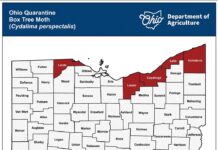SALEM, Ohio – Some experts say the arrival of avian influenza in North America is inevitable; others feel many strains can be kept at bay.
Either way, two Pennsylvania experts are confident in the precautionary measures currently being used.
“It still has the possibility of coming here,” said Gregory Martin, poultry extension educator in Lancaster County.
But there are practices in commercial poultry production in Ohio and Pennsylvania that keep the risk of avian influenza low, he added.
“We keep our birds in confinement,” Martin said, which protects them from having contact with wild birds that could carry the disease.
Open markets. Also, many American consumers purchase processed chicken at the grocery store instead of live birds at open markets. Poultry purchased in an open market has a higher risk of avian influenza because of the number of live birds in contact with each other and contaminated equipment, such as crates, according to Martin.
In addition, avian influenza is a reportable disease that gets immediate attention.
Martin pinpointed modern food processing facilities as another factor that keeps risks low. Even if avian influenza is present in a bird, thoroughly cooking the meat destroys the virus.
While the so-called backyard flocks might raise a bit more concern than commercial poultry, the chances of spreading are still slim, according to Patricia Dunn, head of the avian medicine section in Penn State’s Animal Diagnostic Laboratory.
“There might be a slightly more serious risk, but most of these strains don’t even like to pass between a duck and a goose,” she said.
Martin said backyard flocks pose a greater risk because “people don’t know what the symptoms are for avian influenza.”
Or if they do, they are hesitant to report any suspicious symptoms.
Despite recent outbreaks in Nigeria, Israel, India, Sweden and other countries, Dunn is optimistic about keeping it out of the U.S.
“I don’t think it’s very likely we’ll have an introduction of that particular strain,” she said.
Surveillance. Dunn credited diligent surveillance with keeping the virus under control in Pennsylvania.
“Most states are doing quite a bit of routine monitoring,” she said. “We want to nip it in the bud before it changes or mutates into something worse.”
Martin pointed out that while about 200 people worldwide have had avian influenza, about 40,000 Americans die from type A or B influenza every year.
“I’m more worried about the regular flu than the bird flu,” he said.
Pandemic. Avian influenza doesn’t seem to be easily passed from person to person, but if it becomes transmittable, it could cause an influenza pandemic because humans have do not have immunity to these viruses, according to information from the National Institute of Allergy and Infectious Diseases.
The release also said scientists in New York, Maryland and California have been working to develop a vaccine against avian influenza.
Clinical trials have found high doses of an experimental H5N1 avian influence vaccine produced enough infection-fighting antibodies to neutralize the virus.
(Reporter Janelle Skrinjar welcomes feedback by phone at 800-837-3419, ext. 22, or by e-mail at jskrinjar@farmanddairy.com.)
Symptoms of avian influenza
* Birds appear tired and refuse to eat
* Discharge from the nose, eyes and mouth
* Swelling of the head, eyes, legs, combs and wattles
* Coughing, sneezing and diarrhea
* Sudden death
(Ducks may have the virus without showing signs of sickness.)
(Source: World Health Organization)
Who to call?
* Don’t wait to report sick birds. Early detection can make a difference. To make a report call USDA’s veterinary services at 866-536-7593, your state veterinarian or your local extension agent.










